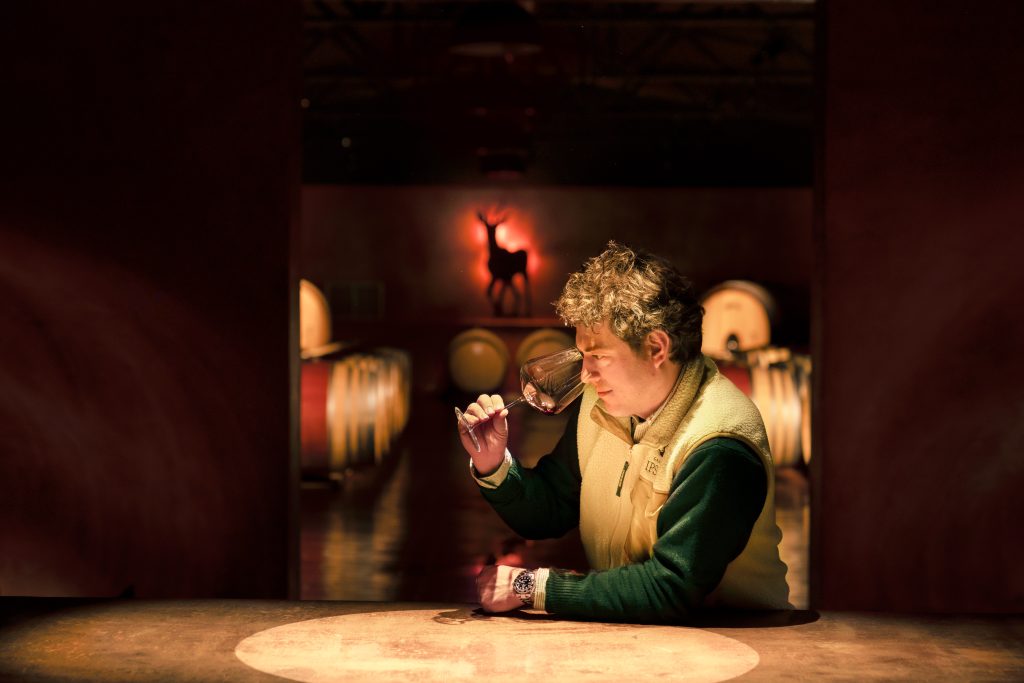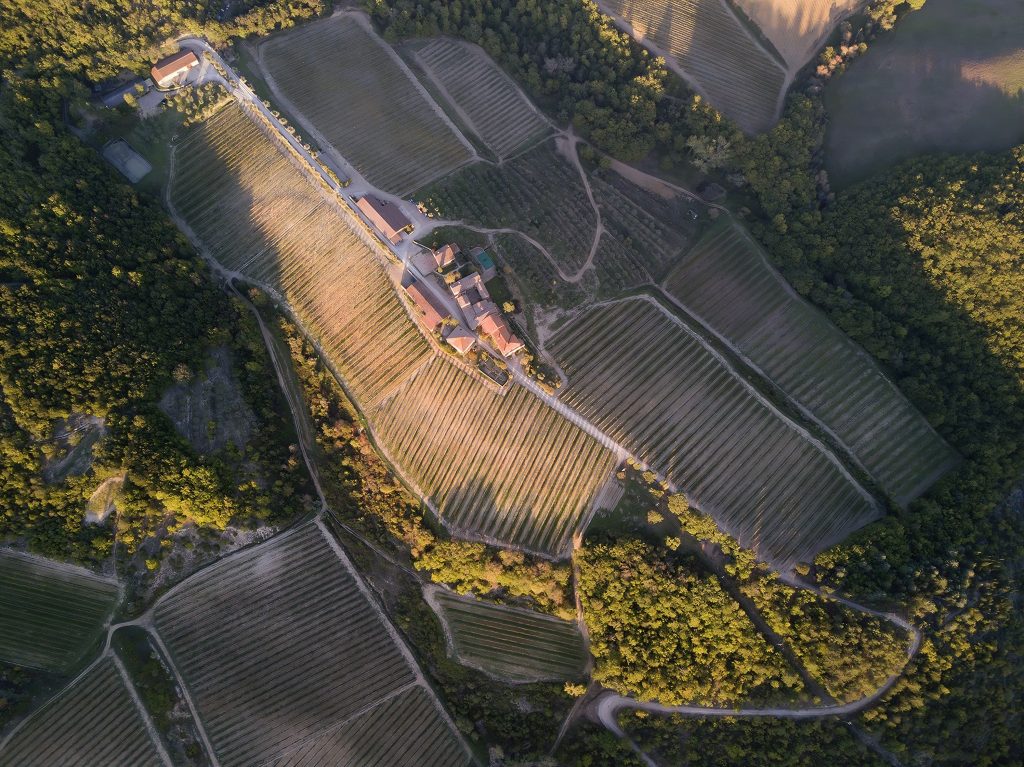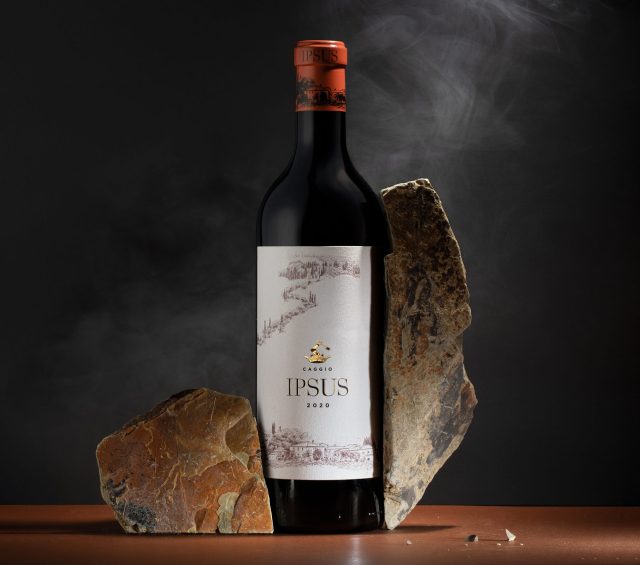This website uses cookies so that we can provide you with the best user experience possible. Cookie information is stored in your browser and performs functions such as recognising you when you return to our website and helping our team to understand which sections of the website you find most interesting and useful.
Ipsus 2020 takes Chianti Classico Gran Selezione to new heights
It is rare, even for someone with the good fortune to taste many of the world’s leading wines, to discover a new wine that is so breathtakingly distinctive and exceptional as Ipsus. Its existence owes much to the creation of the Gran Selezione classification at the summit of the three-tied Chianti Classico pyramid in February 2014. But it owes at least as much to the talent and foresight of Giovanni Mazzei’s whose personal project it is.

That project draws on the 600 years of accumulated experience of the Mazzei family in the vineyards of Chianti (with Giovanni the 25th generation at its helm) and the profound knowledge of terroir that this has imparted. For it is that which led to the identification of the potential of the cooler plots of the Il Caggio estate in the heart of Chianti, with six parcels from within its ‘Clos’ being selected to be planted with the most appropriate clones of Sangiovese. And that selection in turn is itself the product of a half-century of meticulous research, with four of the eight clones coming from Mazzei’s own massal selection programme and three of the others from Chianti Classico clones). The 6 parcels together form a vineyard-within-a-vineyard, the ‘Clos’ (a self-contained and walled enclave) of just 6.5 hectares of the 150 hectares of the Il Caggio estate that was acquired by the Mazzei family in 2006.
I was fortunate enough to be invited to the property in mid-June to taste through a mini-vertical and to discuss the project and the inspiration behind it with Giovanni Mazzei. “I was struck right from our first harvest by the Sangiovese that grows here”, commented Giovanni. “And over the succeeding years we realised that our job was to do as little as possible, and not to alter the equilibrium in the vineyard. Our job is simply to maximise the quality of this magnificent cru”.
The vineyard itself is located on the ridge of a sun-drenched hillside in the idyllic undulating contours of Castellina in Chianti at an altitude of between 316 and 361 metres. The vines have a predominantly south-western and partially south-eastern exposition, giving the vineyard a distinctly Mediterranean microclimate with excellent ventilation and low humidity that together help to reduce the risk of vineyard maladies. The soil is mainly a clay schist mixed with calcareous marl and alberese rock fragments, perfectly adapted for Sangiovese.
Giovanni Mazzei has developed an experimental, organic-cultivation programme at Il Caggio, with the goal of achieving a regenerative viticulture. The estate absorbs five times more Carbon Dioxide than it emit and it utilises carefully-designed cover-cropping to boost organic material in the soil and at the same time to enrich the biodiversity of its agro-biome. That biodiversity is further enhanced by the relatively small area under vine relative to the expanse of the estate.
The final wine is a blend of no less than sixteen micro-vinifications with careful maceration to ensure the most gentle extraction of the fruits of this incredible terroir, creating a high-end expression of Sangiovese combining vibrant aromas and a silky texture. The finished wine is aged for 26 months in 70% new oak tonneaux, 20% in 15 hectolitre oak barrels and the final 10% in ceramic vats. It then rests for a further 6 months in ceramic vats, followed by a further 14 months in bottle prior to its autumn release.
Ipsus is a wine of a rare and incredible purity, utterly beguiling and seamless even in its first vintages. And this is reflected in its name, Ipsus, literally ‘itself’, in reference to the place, the site, the terroir from which it hails. Around 4000 to 5000 bottles are produced, with the 2020 vintage to be released to the global market on 1st October.
The first vintage was the 2015 with the new release being only Ipsus’ fifth, there having beed no production of the wine in 2017. The wine is a pure Sangiovese of exceptional potential. Indeed, what is perhaps most remarkable about this project is quite how quickly that potential has been realised. As my tasting notes (below) attest, it was breathtakingly evident in each of the wines that I tasted.
It was clear from well before the moment of acquisition that the terroir of Il Caggio’s Clos was exceptional, but as Giovanni explained to me, the family’s expectations have significantly been exceeded – as to a large extent have those of the few international critics who have had the opportunity to taste the wine, even from the first vintage.
That is certainly my impression. Overall, it is perhaps the sheer quality of the tannins here that stands out the most, a feat of viticulture and oenology incredible for a wine sourced from such young vines – and from the very first vintage too. Ipsus’s tannins are, for me, the qualitative equivalent of those of a first growth Médoc or (current or former) Premier Grand Cru Classé A from St Emilion. As that already suggests, this is, for me at least, the most crystalline and luminous wine from the Chianti Classico that I have ever tasted. It is a fabulous advert for the Gran Selezione project more generally and immediately on a par with the other leading single-vineyard Gran Selezione wines of the region, from Castello di Ama (namely, Bellavista and La Casuccia) and the other standout wine of the region, in my view, Le Pergole Torte from Montevertine.
Il Caggio Ipsus, Gran Selezione, Chianti Classic

Localisation: Il Caggio, Castellina in Chianti
Size: 6.5 hectare in a single ‘Clos’
Fruit sourcing: from 6 parcels (each of c. 1 hectares) – Cantina di Sopra, Cantina di Sotto, Pero, Campaccio di Sopra, Campaccio di Sotto, Orto
Exposition: predominantly South-Western and partially south-eastern exposition
Altitude: 316-361 metres
Vinification: 16 micro-vinifications
Fermentation: spontaneous, for 10 days, in steel vats with no added yeasts or temperature control
Maceration: submerged cap for 24 days
Malolactic fermentation: spontaneous and complete
Aging: 26 months, 70% in tonneaux (100% new, from Burgundy and Austria), 20% in 15 hectolitre oak barrels, and 10% in ceramic vats
Finishing: the first 6 months in ceramic vats and a further 14 months in bottle
Production: 4000-5000 bottles (in 2020: 4618 bottles, 350 magnums and 50 Jeroboams)
Distribution: Ipsus operates with a subscription model for private customers, offering them the opportunity to purchase through an exclusive allocation once a year on the day of the wine’s release. For broader distribution, the property partners with a carefully selected group of merchants and importers. The goal is to keep the supply chain as streamlined as possible, allowing the provision of a more personalized and tailored experience.
Tasting notes
The new release

The 2020 growing season saw mild weather and well-distributed rainfall, delivering a high-quality harvest. “We saw the expected cold temperatures in winter, along with plenty of rain”, reports technical team leader Gionata Pulignani. “In April, flowering proceeded well despite some cold nights, and a long, warm summer brought ideal ripening conditions. Scattered rains in June and September warded off heat stress in the vines and brought no threat of fungal attacks. Harvest was problem-free and took only 48 hours, from September 22nd to 24th”.
Ipsus 2020 (Chianti Classico Gran Selezione; 100% Sangiovese; for October release; bottled for just over a year; pH 3.39; 13.6% alcohol). A little more serious. Denser. More compact. A wine of incredible power for something so lithe and limpid and, again, viscous and crystalline. There’s plunge-pool clarity in the mid-palate. Pristine purity and precision and also great length and focus. So wondrously layered and beautifully pixilated – like a pointillist’s brushstrokes. More ample than the 2019 with a broader frame, accentuating the sense of layering. A further sublimation, with the learning curve meeting the sheer quality of the vintage! Juicy and sapid. An utterly beautiful wine fully indicative of the potential of this enticing project. 100.
Older vintages
*all tasted at the property with Giovanni Mazzei in June 2024
Ipsus 2019 (Chianti Classico Gran Selezione; 100% Sangiovese; 10% aged in ceramics; 14% alcohol). There’s even greater use of submerged cap maceration in small vinification vessels in 2019. This is immediately dustier and spicier, with more cinnamon and fennel seed than the 2018 or 2016. It’s more complex aromatically too. Eucalyptus. Spearmint. Cinnamon, again. Candle wax. Tomato consommé. Balsamic notes. A hint of liquorice root. But this is also so gentle, aerial, pillowy and refined. A slightly tighter frame than the 2018 with consequently greater concentration and density, but the same luminosity and crystallinity. There’s a richness and viscosity that comes from the terroir too. Incredibly layered, more so than the earlier vintage and with more tannin too. This is more of a vin de garde and it really shows what is possible here. Fabulous. More structured and chiselled and more sophisticated in a way than the earlier vintages. 99.
Ipsus 2018 (Chianti Classico Gran Selezione; 100% Sangiovese; 14% alcohol). The submerged cap vinification contributes to the gentleness of the extraction here. Compared to the 2016, this is much more fruit-forward. Raspberry. A little candlewax. There’s great precision and a sense of purity here, even if this is somewhat less complex in its relative youth than the 2016. Precision is the word that springs to mind, again and again. There’s also a little more volume. A gorgeous shimmering mouthfeel, a little more density and compactness but still incredibly soft, glacial and layered and sublimely crystalline and limpid. Tomato consommé with delicate spice notes. Vivid, bright, vibrant. Like a layer of oil over water – each surface perfectly clear and transparent and with the richness of the former and the fluidity of the latter. Very expressive. Grippy on the finish and with great sapidity. 98.
Ipsus 2016 (Chianti Classico Gran Selezione; 100% Sangiovese; 13.5% alcohol). Very fine, very refined, very lifted and aromatically both gentle and highly expressive. Quite exotic but subtle in its spicing. Garrigue Mediterranean herbal notes too. A touch of saffron. So pure and precise and crystalline. Luminous. Limpid, glacial, but very ‘Sangiovese’ – with lovely balsamic notes, dried flowers and a hint of tomato consommé with the slight textural viscosity that implies. Black tea. Red cherry. I am struck by the sheer quality of the tannins. A wine that is all about mouthfeel, the texture and the touch of the tannins – so gentle, so delicate, so divine. 97.
Related news
Viña Maquis: why 2014 and 2020 were right for this year's La Place campaign
'Vast' gap between hors Bordeaux expectations and market reality
Weingut Günther Steinmetz announces first release on La Place

